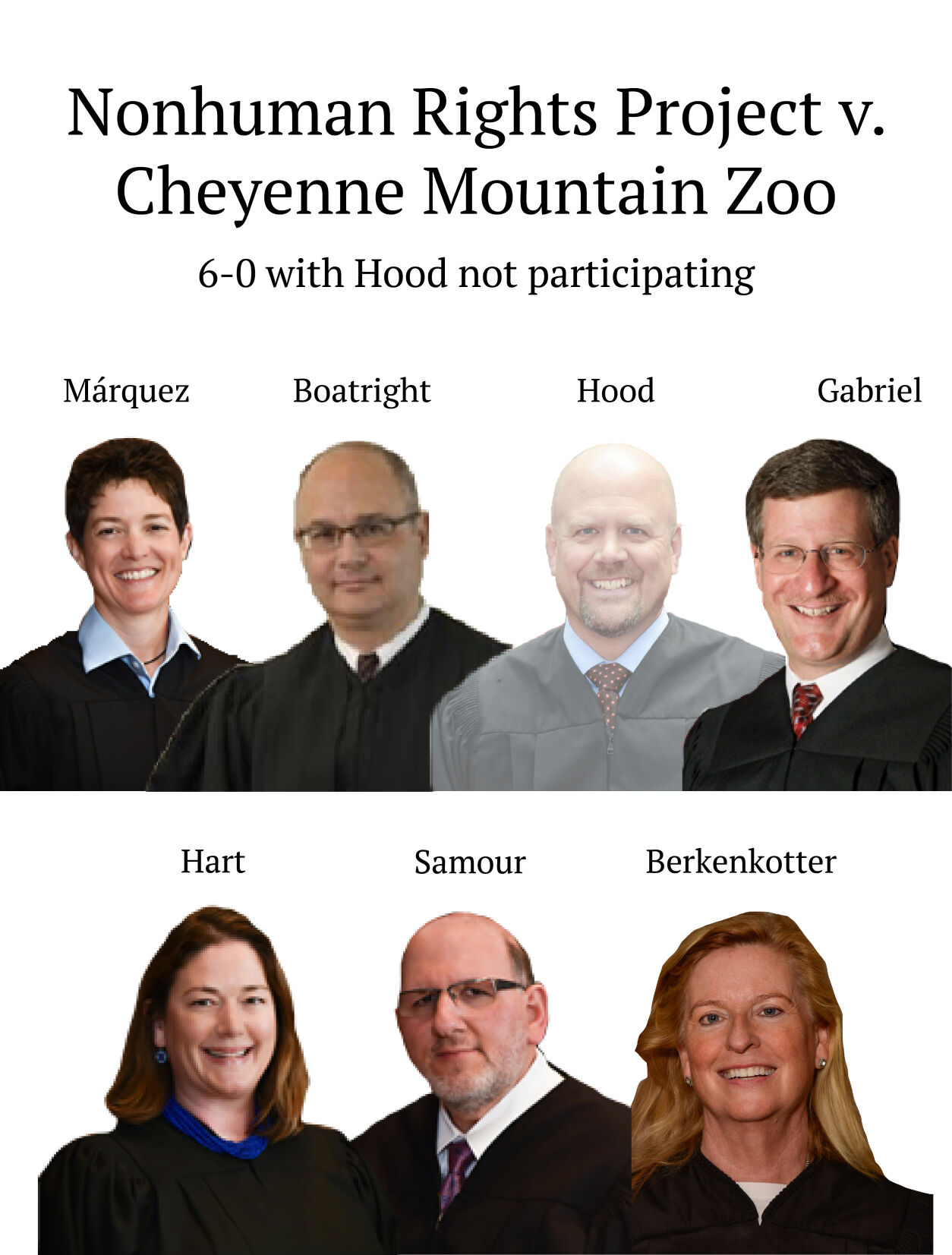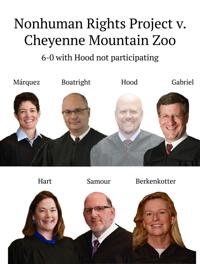Colorado Supreme Court rejects ‘personhood’ for elephants at Colorado Springs’ Cheyenne Mountain Zoo
Q29sb3JhZG8gU3VwcmVtZSBDb3VydCBqdXN0aWNlIE1hcmlhIEUuIEJlcmtlbmtvdHRlciBhc2tzIGEgcXVlc3Rpb24gZHVyaW5nIG9yYWwgYXJndW1lbnRzIG9mIHRoZSBBcm5vbGQgUi4gTWFydGluZXogdiBUaGUgUGVvcGxlIG9mIHRoZSBTdGF0ZSBvZiBDb2xvcmFkbyBjYXNlIGR1cmluZyBDb3VydHMgaW4gdGhlIENvbW11bml0eSBvbiBUaHVyc2RheSwgT2N0LiAyNiwgMjAyMywgYXQgR2F0ZXdheSBIaWdoIFNjaG9vbCBpbiBBdXJvcmEsIENvbG8uIChUaW1vdGh5IEh1cnN0L0RlbnZlciBHYXpldHRlKQ==
VGltb3RoeSBIdXJzdA==
The Colorado Supreme Court followed in the footsteps of its counterparts on Tuesday and rejected the idea that an animal rights organization could petition for the release of five captive elephants in Colorado Springs.
The Washington, D.C.-based Nonhuman Rights Project has unsuccessfully filed suit in multiple states on behalf of confined animals, invoking a centuries-old legal tool known as “habeas corpus” that allows people to challenge their detentions as unlawful.
The group argued habeas rights applied to five female African elephants at the Cheyenne Mountain Zoo, and sought a court-ordered transfer to an accredited animal sanctuary. But the Supreme Court rejected that argument for a straightforward reason: Colorado’s habeas law applies to “persons,” not animals.
“Simply put, no Colorado court, nor any other court in any other jurisdiction in the United States has ever recognized the legal ‘personhood’ of any nonhuman species,” wrote Justice Maria E. Berkenkotter in the Jan. 21 opinion.


The Nonhuman Rights Project sued in El Paso County on behalf of Missy, Kimba, Lucky, LouLou and Jambo — elephants ranging in age from early 40s to mid-50s. The habeas petition outlined the elephants’ intelligence, complex physiological needs and alleged brain damage from being confined in the zoo.
Initially, District Court Judge Eric Bentley acknowledged courts in other countries have ruled that animals are entitled to certain rights and that confinement may be detrimental to the five elephants’ health. But for “better or worse,” he concluded the United States’ founding documents centered humans’ rights, and no court had recognized the personhood of other animals.
Courts may address an ethical problem “only to the extent it is connected to a recognizable legal right. Injustices are everywhere in this world, and the law provides remedies for only a few of them,” Bentley wrote in December 2023.
The habeas appeal went directly to the Supreme Court, where some justices during oral arguments were wary of the slippery slope that could arise from allowing one type of animal to benefit from habeas relief.
“Half the people in this room have dogs or cats and they’re wondering how this applies, perhaps, to their household,” said Berkenkotter. “How would this work?”

Elephants Kimba, front, and Lucky wander through their exhibit at Cheyenne Mountain Zoo in Colorado Springs.
courtesy OF Cheyenne Mountain Zoo

Elephants Kimba, front, and Lucky wander through their exhibit at Cheyenne Mountain Zoo in Colorado Springs.
The Nonhuman Rights Project maintained it was not seeking to open the courthouse doors to all members of the animal kingdom, but rather to recognize the five elephants were uniquely positioned to seek release.
“The dog’s place is your couch. Elephants are wild animals. They exist entirely separate and apart from human society,” argued attorney Jake Davis.
The Nonhuman Rights Project received support from a range of outside participants, including academics and lawyers based in the United Kingdom, leaders in the LGBTQ rights movement and a retired member of South Africa’s highest court. Some of the briefs pointed out habeas proceedings have been used to free enslaved persons, women under their husbands’ control and others who previously had limited legal rights.
“Those are all kinds of people that the law may have been blind to in the past,” responded Justice Melissa Hart, “but we all recognize those as persons.”
Berkenkotter, in the court’s opinion, noted Colorado law defines “person” to include individuals, corporations and government entities — but not animals.
Extending personhood to animals “is the type of monumental change in the law that one would reasonably expect the General Assembly to make explicit,” she wrote.
Berkenkotter added that courts in New York and Connecticut have rejected the Nonhuman Rights Project’s arguments on similar grounds. She also observed the organization, by seeking the elephants’ transfer to a sanctuary, was not actually intending for their release from confinement.
“It bears noting that the narrow legal question before this court does not turn on our regard for these majestic animals generally or these five elephants specifically. Instead, the legal question here boils down to whether an elephant is a person as that term is used in the habeas corpus statute,” Berkenkotter concluded. “And because an elephant is not a person, the elephants here do not have standing to bring a habeas corpus claim.”
University of Denver law Prof. Justin Marceau, who submitted a brief in support of the Nonhuman Rights Project, deemed the ruling a “grave injustice.”
“The court has passed up an opportunity to bring the law into line with current cultural and scientific understandings about animals,” he said. “The more we learn about animals, the more difficult it becomes to justify denying them basic rights.”
In a statement, the zoo criticized the Nonhuman Rights Project for bringing the lawsuit and others like it.
“While we’re happy with this outcome, we are disappointed that it ever came to this. For the past 19 months, we’ve been subjected to their misrepresented attacks, and we’ve wasted valuable time and money responding to them in courts and in the court of public opinion,” the zoo said.
Justice William W. Hood III did not participate in the appeal. As is the Supreme Court’s practice, he did not disclose his reason for recusal.
The case is Nonhuman Rights Project, Inc. v. Cheyenne Mountain Zoological Society et al.






